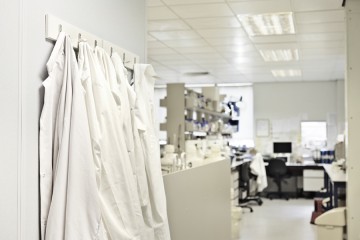A faculty-led Johns Hopkins University committee today released a 40-page report examining the landscape of the biomedical research enterprise at the university and offering 24 related recommendations for how Hopkins can strengthen its support for its biomedical workforce.
Concurrently, Johns Hopkins, along with eight other U.S. research universities and a major cancer institute, announced plans to give would-be life scientists clear, standardized data on graduate school admissions, education, and training opportunities and career prospects.
Both efforts are a response to stresses on the current system of biomedical research, including declines in federal research funding, the limited number of academic career opportunities, and the absence of reliable information on rewarding alternative careers for talented scientists.
"[Johns Hopkins is] the place where the next generation of science leaders will be trained and then work together to produce the discoveries of tomorrow," Johns Hopkins University Ronald J. Daniels and Provost Sunil Kumar wrote in a message to faculty, staff, and students today. "We have a responsibility to them, not only to honor best practices but to define those practices—by working assiduously to create the strongest possible platform for our scientists."
The committee, led by professors Pierre Coulombe and Wendy Post, spent the past year compiling data, convening focus groups, and looking at the practices of peer universities. The group found that the state of the biomedical research enterprise at Johns Hopkins is strong, but that there are strains related to trainee mentoring and career preparation, supporting faculty at a time of dwindling federal funding, and inefficiencies in how science is conducted in laboratories.
Their recommendations, broadly, include:
- Promoting an academic culture that enables and supports professional growth and career development while embracing work-life balance
- Providing comprehensive data and scaled resources for the aspirations of JHU's biomedical research community
- Creating platforms of support for biomedical faculty to advance the joy of shared discovery, with a particular focus on the needs of early career investigators
- Identifying a leader responsible for implementing the committee's recommendations and a cross-university body to provide oversight
"It is fair to say that the nation is at an inflection point in the academic biomedical sciences," the report concludes. "We have been poised to transform medicine, public health and society at large, given the range of recent advances in knowledge and technology. And yet, to act fully on this potential, we will need to forthrightly face a number of looming challenges in the way in which we approach biomedical science, in areas ranging from research support to innovation to collaboration to reproducibility.
"There is deep concern about the environment the nation has created for the incoming generation of scientists, and the science they will produce. The federal government has retrenched in its support of biomedical research, and the federal-academic biomedical compact shows sign of fraying.
"Johns Hopkins is the university that created the modern research university on U.S. soil, and the moment is ripe for it to be a leader in defining the next generation of biomedical training and research. But doing so will require oversight and diligence and a shared commitment as one university."
In their message, Daniels and Kumar invite members of the Hopkins community to read the committee's draft report and submit feedback. Comments, which can made via the committee's website or sent to biomedicalcommittee@jhu.edu, should be received by Jan. 15. A final report and implementation plan will follow.
Posted in University News
Tagged biomedical research, research funding










